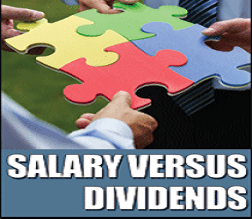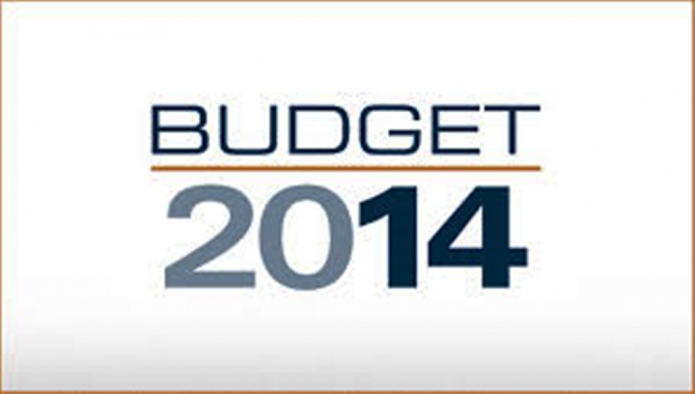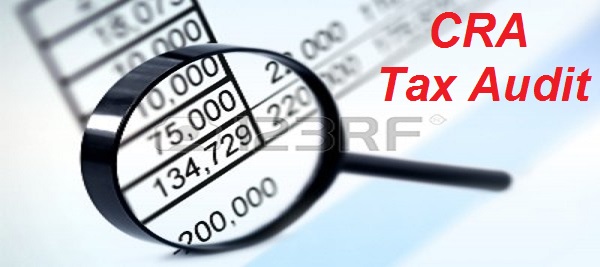Salary or Dividends – How Should You Get Paid by Your Company?
Are you an incorporated business owner wondering whether you should pay yourself salary or dividends? It is not a simple straight forward question and there is no one-size-fit-all answer to it. Due to the introduction of eligible and non-eligible dividends and the changes of the gross-up and dividend tax credits in the past few years, the simple rules of thumb that used to work in the past do not apply any more. You should consider the following five factors based on your own specific circumstances to tailor-made your own salary-dividend strategy.
Annual Spending
First, approximately how much money do you need to take out from your company for the whole year for personal spending? You should plan your salary-dividend strategy for the whole year rather than on a piecemeal basis. Why? As an individual, your personal tax is determined based on progressive tax rates that apply your total income for the whole year.
Income Splitting
Second, do you have a spouse or adult children in the lower tax bracket who can receive salaries or dividends from your company? The idea is to split the income to reduce the overall tax bill for your family. However, it would be prudent for you to check with a tax accountant before making any payments to family members. There are many tax traps in this income splitting area. For example, salaries paid to family members needs to be reasonable. Generally speaking, salaries would not be considered as reasonable if you are not willing to pay the same salaries to another person not related to you for performing the same duties. Also, dividends paid to minor children are subject to kiddie tax at the top marginal rates.
Combined Personal and Corporate Taxes
Third, compare the total income tax that you and your company will have to pay on the money taken out as salaries vs. dividends. Salaries are expenses to your company. Dividends are not. What do they mean? If the money is taken out as salaries, your company does not have to pay tax. All tax is borne by you. On the other hand, if the money is taken out as dividends, your company has to pay tax on the income, then distributes the after-tax income to you as dividends. Unlike salaries, dividends are taxed on your hands based on a special gross-up and dividend tax credit system. This special tax system is intended to integrate your personal tax on dividends with your company’s corporate tax on income such that the total tax to be paid by you and your company would be the same as the personal tax you would have to pay if the money is taken out as salary. However, due to the differences in provincial tax, we do not have a perfect tax integration system in Canada. Depending on the province you live in and the income level of you and your company, you may find either a tax saving or a tax cost for taking money out as dividends. For 2014, the discrepancy in the total tax for taking money out as dividends instead of salaries could range from 2.4% of tax saving to 8.1% of tax cost.
Employment or Earned Income vs. Investment Income
Fourth, salaries and dividends are two different types of income for tax purposes. Salaries are employment income or earned income. Dividends are investment income. What do they mean?
Let’s talk about salaries as employment income or earned income.
- For 2014, salaries of $3,500 up $52,500 are subject to CPP/QPP premiums. The combined premium rate for you and your company is 9.9% for CPP or 10.35% for QPP. This can be either a positive or negative factor for taking salaries depending whether you are interested in participating in the CPP/QPP. Note that other than pension benefits, the CPP and QPP also provide disability benefits.
- Additionally, salaries will allow you to contribute to an RRSP or an individual pension plan as your retirement vehicles.
- Salaries also qualify you for child care deductions and employment tax credit. Some form of salaries also helps to justify non-taxable benefits such as health and dental insurance coverage.
- However, salaries are subject to normal payroll deductions. Your company needs to determine the right amount of source deductions and remit to the CRA in a timely manner. The penalty for late remittance can be as high as 20% for repeated late payments.
- Also, salaries paid to family members are likely to be scrutinized by the CRA for reasonability.
Now, let’s talk about the dividends as investment income.
- Unlike salaries, dividends are not subject to the same reasonability test. Dividend can be an effective means of income splitting with family members who may own shares in your company directly or indirectly through a family trust. However, as I said before, dividends should not be paid to children under the age of 18 to avoid the punitive “kiddie tax”.
- Shareholders with no income other than dividends can receive a certain amount of dividends without paying any personal tax. The amounts of tax-free dividends vary by provinces and the types of dividends. For example, an Ontario shareholder may receive up to approximately $43,000 of non-eligible dividends or $49,000 of eligible dividends without paying any personal taxes.
- Dividends are not subject to withholding tax at source. However, you may be subject to quarterly income tax instalments if you continually take dividends.
- Dividends are not subject to CPP/QPP contribution premiums.
- However, dividends do not generate contribution rooms for RRSP or individual pension plan.
- Also, dividends do not qualify you for child care deductions or employment tax credit.
Tax Deferral Benefits
Fifth, if you do not need to take all the income out of your company for personal spending, there is a “tax deferral benefit” of leaving the income in the company. This is because your company’s corporate tax rate generally would be lower than your personal tax rate. For 2014, for business owners in the top marginal tax bracket, the tax deferral benefits vary by provinces and range from 13% to 36% depending on the income level of your company.
In conclusion, you should consider the above five factors to tailor-make your own compensation strategy (salary or dividends) based on your specific circumstances.
We Can Help
We are a Toronto Chartered Accountant firm with 20 years of specialized experience in Canadian domestic and international taxation. We can assist with
- Cross border taxation;
- Business and succession planning;
- Canadian personal and corporate tax returns;
- Corporate tax planning and reorganization;
- Retirement planning;
- Estate planning and inheritance tax advice; and
- Tax audit dispute and resolution.
Contact us to schedule an appointment.
__________________________________
The information in this article is general in nature and does not constitute professional advice. We recommend that you obtain the appropriate professional advice before acting on any of the information contained herein.







